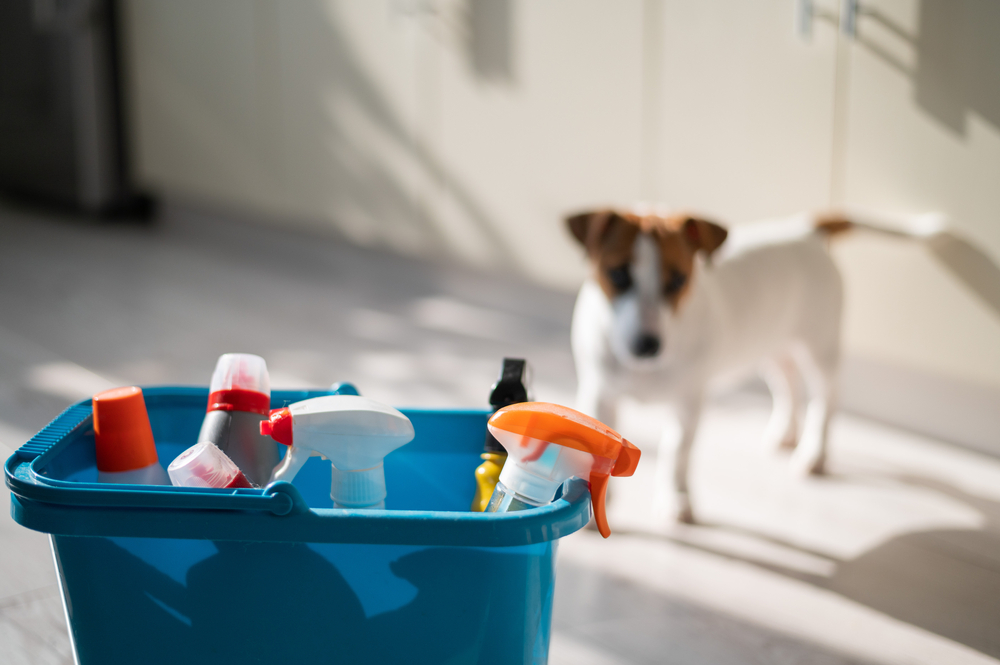Being hit by a car, attacked by an animal, contracting contagious diseases—these are all obvious concerns for pet owners. But, what about the everyday items we use in our homes? Many seemingly innocent cleaners, chemicals, and items that we use regularly can put pets at risk. Therefore, to protect your pet, you must understand the pet dangers that often fall under the radar. Our Memorial Animal Hospital team covers common household dangers for your pet that may surprise you.
Surprising everyday items that can hurt your pet
Your home is likely your haven of comfort and security for your family, including your pets. However, dangers lurk in unexpected places that can harm our furry friends. From everyday household items to seemingly harmless outdoor activities, here are some pet dangers that may surprise you.
Xylitol
This sugar substitute is commonly found in sugar-free gum, pastries, candies, and some peanut butter brands. While people can safely eat foods that contain xylitol, this ingredient can be extremely toxic to pets and cause a rapid insulin release that leads to hypoglycemia (i.e., low blood sugar), seizures, and sometimes liver failure. Understand which products contain xylitol, and never give your pet any item that contains this dangerous ingredient.
Chocolate
Many of us love chocolate, but two ingredients, caffeine and theobromine, can be extremely toxic for pets and can cause vomiting, diarrhea, restlessness, elevated heart rate, and seizures. Dark chocolate and Baker’s chocolate are particularly dangerous. Never feed your pet any food that contains chocolate or cacao.
Essential oils
Many people use these oils for aromatherapy to promote relaxation, a sense of calm, or better concentration and alertness, or they simply enjoy the oils as a home fragrance. However, some essential oils, such as tea tree and peppermint, can be toxic to pets if ingested or absorbed through the skin. Birds especially are sensitive to essential oils and can be gravely affected by the fumes. Use essential oils cautiously and keep them stored securely away from pets.
Stringed objects
Cats are notorious for their fascination with string, yarn, and similar items—you probably know this already, because you’ve watched your whiskered friend bat at a feather on a string. Unfortunately, any of these items can be extremely dangerous and potentially life-threatening for your pet. String-like objects can become wrapped around the intestines and cause an intestinal blockage or cut off blood supply, so be mindful of string-like materials in your home and keep them out of reach of playful cats.
Lilies
Lilies are another serious health risk, especially for your cat. Lilies may be beautiful, but only a small nibble is highly toxic. Cats who ingest any part of the lily plant, including the petals, leaves, or pollen, or drink the vase water, can suffer irreversible kidney damage and possible kidney failure. Do not keep lilies in your home if you have cats, or opt for harmless imitations.
Outdoor chemicals
During winter, many people use ice-melting products to keep their driveways and walkways safe, but some of these products contain chemicals, including calcium chloride and sodium chloride, that can harm a pet who ingests or simply comes into contact with them. Antifreeze ingredients include ethylene glycol and methanol, both potentially fatal to pets when ingested. Ensure you choose pet-safe ice-melting products and wipe your pet’s paws after outdoor walks to prevent them from licking potentially harmful chemicals. Store antifreeze on a high shelf in the garage, and always immediately clean up spills on the driveway or garage floor.
Dryer sheets
These may seem completely harmless, but they contain chemicals and fragrances that can cause gastrointestinal upset in your pet if they decide to taste a sheet or two. Store dryer sheets safely out of pets’ reach, and consider using pet-safe laundry products.
Liquid potpourri

Like essential oils, potpourri can make your home smell fabulous, but are unsafe for pets. If ingested, pets can sustain burns to the mouth, esophagus, and stomach, which cause drooling, difficulty breathing, and vomiting. Ensure liquid potpourri containers are placed out of your pet’s reach and consider safer alternatives, such as simmering an herb and spice mix on the stove.
Our homes and gardens are filled with many items that owners often overlook as pet dangers, but awareness of these potential household hazards and keeping them out of reach can help your pet stay safe and healthy. If you suspect your pet has ingested a toxic item, contact the Pet Poison Helpline immediately and take your pet to the nearest emergency veterinary clinic.
With diligence, awareness, and care, you can create a safe, loving environment for your pet. Contact us if you need more information on household dangers and to schedule a wellness appointment. Our Memorial Animal Hospital team is always ready to help.






Leave A Comment